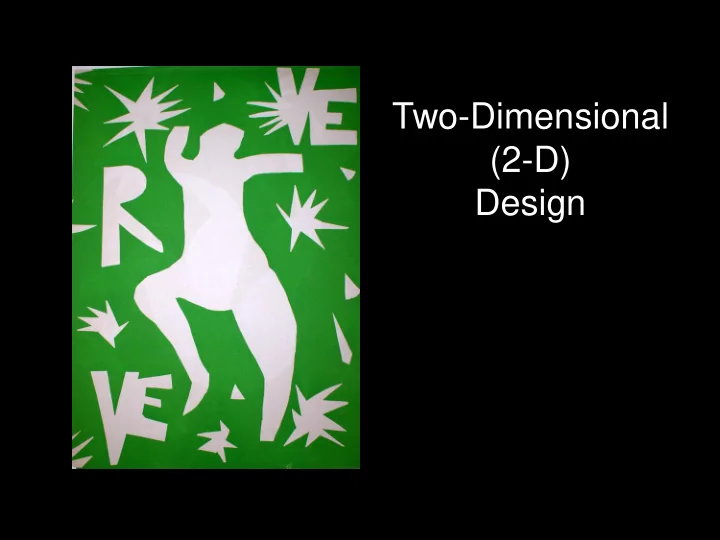

Two-Dimensional (2-D) Design
A working definition: Orchestration of the ELEMENTS of art …
Line Cy Twombly - Untitled
Shape Arthur Dove - Formation I
Space Giovanni Battista Piranesi - Carceri, Plate XI
Color Stuart Davis - New York Elevated
Value Imogen Cunningham - The Unmade Bed
Texture Edward Hopper - Night Shadows
Pattern Miriam Schapiro - The Poet #2
According to the PRINCIPLES of design: Unity/Variety Emphasis Balance Rhythm Repetition Proportion / Scale Figure / Ground
Unity &Variety generally exist in relationship to one another in 2-D compositions Unity: elements are visually similar to one another Variety: elements visually contrast with one another
Unity similarity of textures promote unity Anselm Kiefer - Jerusalem
Unity repeated color harmonies promote unity George Tooker - Fiesta
Unity repeated shapes promote unity Maxfield Parrish - Lantern Bearers
Variety Contrasting color, pattern and texture create visual interest Henri Matisse - La Musique
Variety contrast creates focal points which draw attention to various areas of the piece Romare Bearden - Spring Way
for example Focal point created by isolating a shape Romare Bearden - Spring Way
focal point created by color contrast Richard Hart - editorial design
Focal point created by “lines of force” - other elements directing the eye toward focal point George Bellows - Sharkeys
Sally Mann - Shiva at Whistle Creek
Balance Equal distribution of visual “weight” within a composition - symmetrical / asymmetrical Tabor Photo-graphic - I want to understand
Symmetrical Balance virtually identical elements in each half of the composition Diane Arbus - Identical twins
Asymmetrical Balance Equal distribution of “visual weight” within quadrants of composition, but not identical elements Andreas Feininger - Railroad Ferry Hudson River, New York
for example a. many small or complex elements can balance a large simple one Pierre Bonnard - Model in Backlight
b. small dark elements balance large light ones Pierre Bonnard - Model in Backlight
Rhythm visual elements repeat in such a way as to evoke a “beat” “regular” rhythm Man Ray - Rayograph 1926
“irregular” / contrapuntal rhythm Marcel Duchamp - Monte Carlo
Proportion / Scale Proportion - size relationships within the composition John Heartsfield - Millions stand behind me
Proportion / Scale Scale - relative size of elements compared to an external standard Frida Kahlo - What the water gave me
Figure / Ground Relationships Both figure (“positive shapes”) and ground (“negative shapes”) appear to be purposefully constructed . Aubrey Beardsley - The Toilette of Salome
Figure / Ground Relationships Munday Morning Creative Group - Centex Corp. Hearts And Hammers program logo Ambiguous figure / ground relationships often used in logo design
2- D Design “Lens” Evaluation of the composition of the work - Is understanding of the principles of design evident in this work? Were the elements created and used in purposeful, imaginative ways? Are the principles used intelligently and sensitively to contribute to its meaning? How and what does the interaction of the elements and principles of design contribute to the quality of the work?
Photography Drawing Painting Typography Printmaking Digital Graphic Design Etc.
Good Drawing / Poor Design
Most of the visual weight (small complex shapes) on this side of the composition - few counter-balancing elements on the other side. Rembrandt - The Young Haaringh
Most visual weight on this side of the composition. Eye direction of Magdalene directs viewer off the page Annibale Carracci - The Penitent Magdalene in the Wilderness
Figure / ground relationship weaker on this side. Dynamic Figure / ground relationships on this side Fewer elements to balance more complex right side Most visual weight on this side Claude Garache - Seated Woman with a Fan
“Poor” Drawing / Good Design
• overlapping forms create illusion of space • repetition of shape unifies & sets up visual rhythm • complementary color harmony • visual weight well distributed top / bottom, side to side Milton Avery - Birches
• complexity of birds & dogs balanced by brighter colors on left side • repetition of triangles & semi-circles promotes unity • similarity of color values promotes unity Kiki Smith - Come Away With Her
• repetition of L shapes promotes unity. • repetition of rectangles, dots & lines sets up visual rhythm • dark top half effectively balanced by complexity of bottom half Phillip Guston - Green Rug
Good Drawing/ Good Design
Audrey Flack - Jolie Madame
Jack Levine - Reconstruction
Hiroshige - Bridge at Awate
Franz Kline - New York
Bo Bartlett - Leviathan
Recommend
More recommend